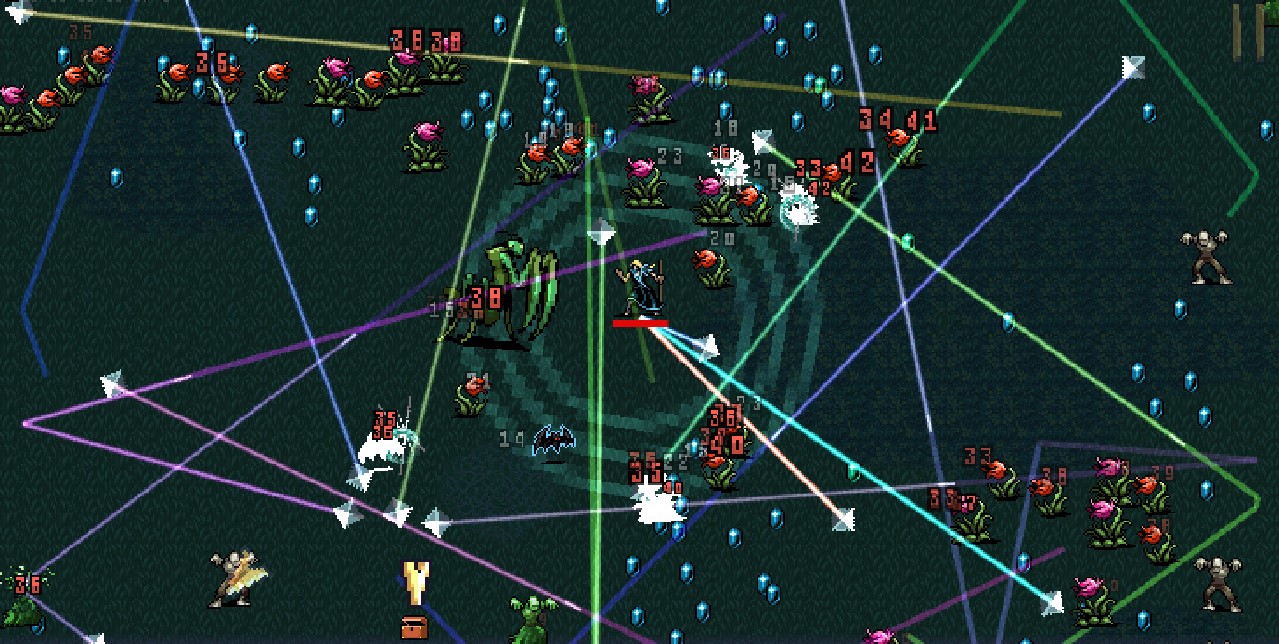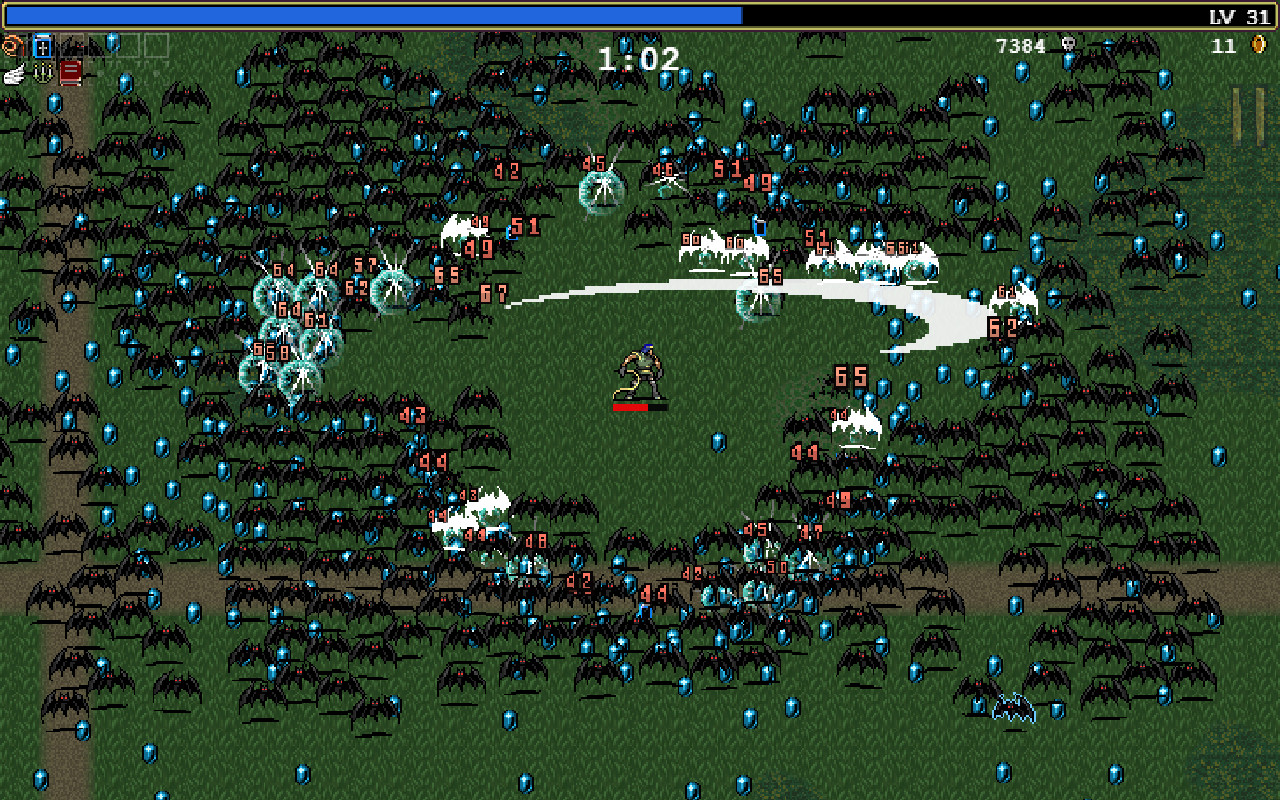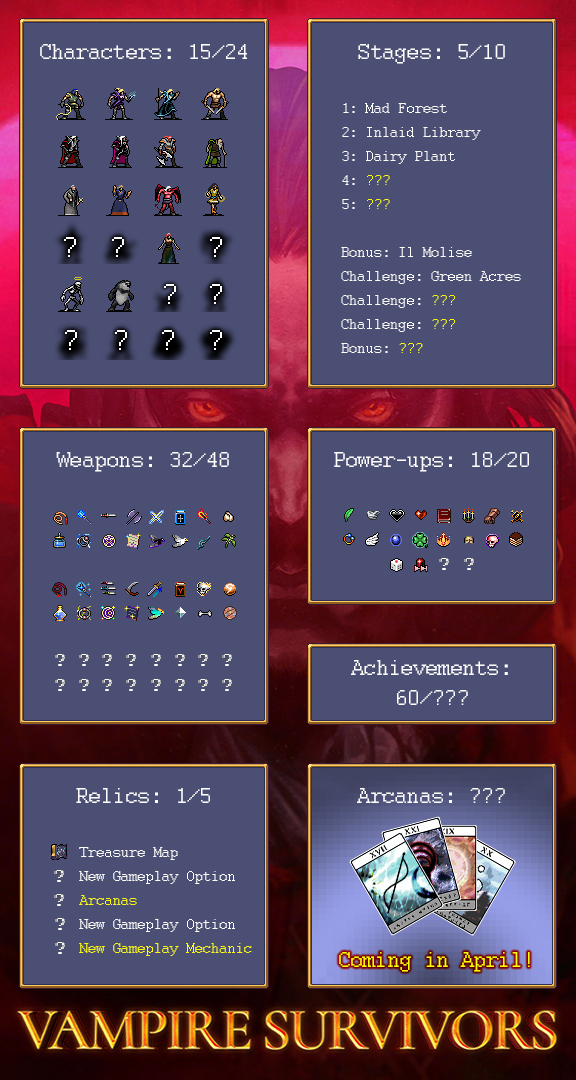Vampire Survivors creator 'didn't have a vision' when he started making the game that allowed him to quit his job
"I don't care for balance that much: it's a singleplayer game."

Vampire Survivors was released on December 17, 2021, and quickly became a word-of-mouth hit. It's a simple-looking game but the great pleasure here is in how it escalates: What begins as a lone figure whipping skeletons is soon enough a coruscating supernova of liquid death destroying legions of ghouls with every step.
The game was initially inspired by an Android mobile title, Magic Survival. "I've always been making games in my spare time, basically, and was looking for a job at the time," says Luca Galante, the developer of Vampire Survivors. "And because I was playing Magic Survival I thought to try and make my version. And so just came up with a prototype that played, you know, exactly like Magic Survival. And then I was done with it, honestly!"
Things changed when Galante looked again at an asset pack he'd bought years beforehand, one which was clearly inspired by Konami's Castlevania series. He replaced the prototype's placeholder sprites with these vampires and ghouls and "absolutely fell in love with the visuals."
"And so from then on, I just started to build the game, piece by piece: I didn't have a vision," says Galante. "I just put elements in to try and make things fun."

This is one of the most striking things about Vampire Survivors' appeal: There is lots of stuff in there that feels frankly overpowered, and you have enormous fun using it. It feels like a game where the unexpected combinations can completely change how it plays, and one that doesn't especially mind if the player ends up with godly powers.
"I spent quite a lot of time testing with just two or three weapons really," says Galante. "I was more focused on trying to put as much stuff as possible on-screen. [Laughs] I still wasn't thinking about how this is actually going to get fun. Then I started to build in the combos try to diversify the weapons so that they feel different, and without worrying too much about which one is strongest really. I don't care for game balance that much. It's a singleplayer game, I'm more than happy for people just to go for what they have fun with.
"So I want everything to be viable. And if there are some weapons that are completely broken, that's fine. As long as they're fun, I'm fine with it, it will be up to the player to make the choice to either go for the easy way, or just go for the weapons they like instead and make a challenge for themselves."
The biggest gaming news, reviews and hardware deals
Keep up to date with the most important stories and the best deals, as picked by the PC Gamer team.
Another aspect of the game that surely helped in its success is that Vampire Survivors costs $2.99 on Steam. That's definitely impulse purchase territory, and it was easy for folk to climb on-board when everyone was getting excited about it.
"The reason for that is because I felt like it was a fair price for what I was offering," says Galante. "Which is a product that I developed in my spare time, and by spending a total of £1100 on assets, basically, between the illustrations and the sounds. So that [price] just sounds fair to me. And then I'm really happy that people want to pay more for the game, of course, and the price will go up once it's out of early access or closer to completion, but once again, I need to feel like it's a fair deal. One shouldn't only aim to try and make as much profit as possible from it: This just doesn't work for me."
here is Yatta Cavallo, a hippo that throws funny fireworks #vampiresurvivors pic.twitter.com/geAzVEyFPoFebruary 20, 2022
That attitude clearly works for the audience too: Vampire Survivors currently sits at 66,000 user reviews that average-out to an 'Overwhelmingly Positive' rating on Steam. The level of success it has seen is hard to quantify, though any indie game that boasts an average of around 25,000 players a day isn't doing too badly. I asked Galante how success had changed things, and it sounds like much of it is firefighting.
"I wasn't expecting all these issues because I was expecting, if I were to get lucky, 1-200 players," laughs Galante. "And you know, if 1% of those players have a problem, it's easy, you will find a way to sort out that user. When you have players numbering in the hundreds of thousands, even if 1% of those people experience a problem, it's a very large amount of people you need to deal with, to support. So yeah, the amount of work is insane right now. And I still haven't managed to sort everything out! Yeah, things are a bit bigger than expected."
The future for the game is now obviously going to be more ambitious than initially planned. "I published a roadmap finally just last week," says Galante. "So where people can have a look at what percentage of completion we are for the game: Right now we're at about 70% of the content so we can expect more, you know, characters, stages and all things we already know. But also, there are two big gameplay features planned that will change the way people play the game. If they want to. Of course, it will just add more on top of what is already there. A new layer of you know, of power creep, and all that."

OK, time for my slightly controversial technical opinion that I hope the PC Gamer hardware team never see. I kind of like slowdown, as in when the framerate decreases, in specific circumstances and particularly when it happens in a vaguely bullet hell context. When things really amp up in Vampire Survivors, the slowdown can also get immense, and it doesn't make me mad, it makes me nostalgic. Forgive me, tech purists. Does Galante think slowdown can sometimes be…
"Good? I might like it, depends a lot on the game," he laughs. "Frame freeze, absolutely love frame freeze done at the right time. But you know, those are games almost designed to slow down, there are a few where I absolutely love to see this: Odin Sphere on PlayStation 2, the older version that used to slow down a lot, and I absolutely loved it for some reason. The version they released recently is such a smooth buttery 60 fps instead. And I love it as well. But yeah, it makes me miss the feeling a little bit!"
Galante did clarify that he sees the slowdown in Vampire Survivors as a technical issue, and as time goes on the intention is to make the game much smoother ("I know what the bottleneck is")—he also adds with a smile that he "might add frame freezes, though."
I end by asking Galante about what the game's success means to his career: He'd mentioned that around the time it came out he was looking for work as a web developer.
"Yes, the plan was to start the year with a change of job," says Galante "Just to start making a career as a web developer because it pays well and get a mortgage and buy a flat in London. One week after I got the new job, I had to leave it because of Vampire Survivors. So yeah, [Galante mimics an explosion with his hands] blast, all completely upside-down. I don't care about buying a flat anymore. I just care about doing what I always wanted to do, which is to make games. And that's why I feel really grateful for this opportunity, for the surge of luck. And I'm going to try and turn it into something you know, that is gonna last."

Rich is a games journalist with 15 years' experience, beginning his career on Edge magazine before working for a wide range of outlets, including Ars Technica, Eurogamer, GamesRadar+, Gamespot, the Guardian, IGN, the New Statesman, Polygon, and Vice. He was the editor of Kotaku UK, the UK arm of Kotaku, for three years before joining PC Gamer. He is the author of a Brief History of Video Games, a full history of the medium, which the Midwest Book Review described as "[a] must-read for serious minded game historians and curious video game connoisseurs alike."

